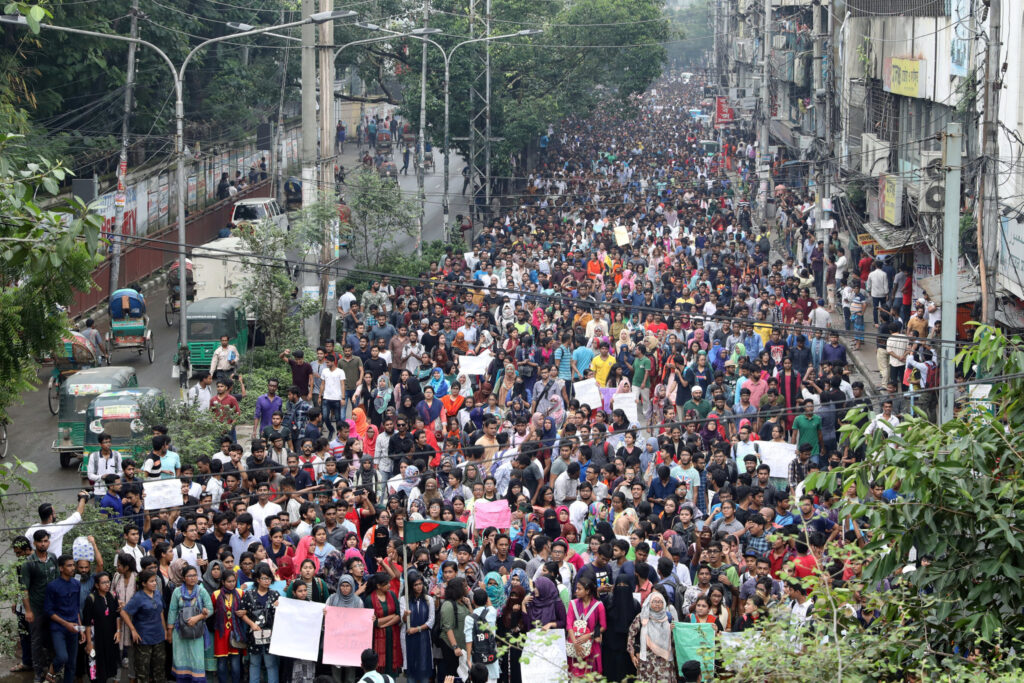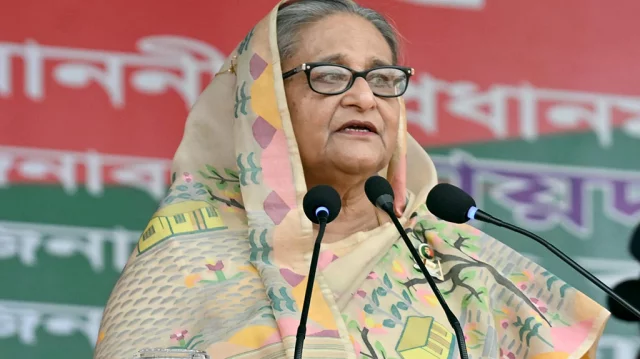The title of “Razakar” is highly offensive in the South Asian country of Bangladesh. With a population of over 170 million, the nation with a rapidly growing textiles industry only gained independence from Pakistan in 1971. But why is the term so derogatory? It refers to those who allied with the Pakistani military during BD’s 1971 liberation war, ultimately ending up as traitors and treasonists in the eyes of the Bangladeshi people.
This is the name that has been assigned to the hundreds upon thousands of students currently protesting the BD government’s civil work quotas, by the Prime Minister of Bangladesh, Sheikh Hasina Wazed.
Wounded Students, and An Even More Wounded Government
The Awami League, PM Hasina’s political party, and the leading party of Bangladesh, took to social media platform X to blast student protesters. “Pro-Quota Reform activists have become extremely violent — Quota-reform activists severely beat the Deputy Social Media Secretary of @bslBD1971,” said the League, with an attached picture of said Secretary Hamza Rahman Antar in a bloodied state.
The Awami League, however, conveniently did not mention the 100 students injured across the country on Monday, July 15. The students were hurled at with rocks, sticks, iron rods, boiling water, and acts of violence were used, particularly inflicted by the student section of the Awami League, otherwise known as the Chhatra League. The Chhatra League (BSL) is a student political organization founded by Sheikh Mujibur Rahman (Hasina’s father, the nation’s founder) in 1948.
These protests began earlier this month in response to the High Court ordering the restoration of the previously suspended 30% job quotas for the descendants of Freedom Fighters who are the children and grandchildren of those who fought in the liberation war in ‘71. The students argue that this recruitment system favors and offers unfair advantages to children of war heroes and certain parties, particularly for well-paying government jobs. Specifically, students are demanding a merit-based recruitment system.
In early July, the students blocked roads and other infrastructure in the Capital of Dhaka and other major cities, bringing traffic to a standstill and disturbing the metro rail system. Their barricade has been named ‘The Bangla Blockade.”
Furthermore, following PM Hasina’s claim that those who “oppose job quotas for relatives of freedom fighters are ‘Razakar,” according to Reuters, thousands of students left their dormitories on the Dhaka University campus at midnight to protest. According to Scroll.in, an Indian news organization, students began to chant, “Who are we? Razakar!” They altered the infamous Liberation War slogan, “Who are we? Bengali,” to empower themselves, much to the dismay of Awami League supporters and other pro-government leaders. Another notable chant echoed by students was, “Chaite gelam odhikar, hoye gelam Razakar,” which translates to, “Asked for rights and became a Razakar.”

However, according to Nahid Islam, the coordinator of the anti-quota protest, the horrific violence inflicted upon protesters will not thwart the movement. He told Reuters on July 15:
“This is more than just a student movement. To suppress this movement, incitement from the highest levels of government have been made. So, common people have to come to the streets.”
Continued Efforts
Bangladeshi students are no strangers to protests. The New York Times reported on July 11 that even six years ago, students across the country were staging demonstrations against this system, which “guaranteed that quota holders would get more than half of government jobs.” Following weeks of demonstrations and protests, PM Hasina’s government declared quotas abolished and established a merit-based system.
Akram Hossain, the 2018 protest coordinator told the New York Times, “the current movement this time is more organized because six years ago students feared attacks from the student ruling party,” and that organizers used phony social media accounts to communicate information about marches and other gatherings, while avoiding government surveillance.
Hasina: Everyone is Razakar
PM Hasina is the daughter of the country’s founding father, Sheikh Mujibur Rahman. To her luck, when most of her family members were shot dead in a military coup in 1975, she was touring Europe.

She returned to Bangladesh from India, where she was exiled. In the 1980s, Hasina teamed up with political rival, BNP (Bangladesh Nationalists Party, rivals of the Awami League) Chief and former PM Khaleda Zia to lead an uprising in the name of democracy against military ruler Hossain Mohammad Ershad in 1990. The alliance did not last for long, the two women constantly at each other’s throats. That is, up until Zia was thrown in jail with a seventeen-year sentence for a corruption case, eventually released in 2020 and placed on house arrest due to health concerns. The BNP claims that this was a deliberate move made by Hasina’s government in order to keep Zia away from politics.
Hasina, however, has become the longest reigning politician in Bangladesh, due to years of jailing opponents, extrajudicial killings, and more “girlboss” moments. Hasina “refused BNP demands to resign and allow a neutral authority to run the election, accusing the opposition of instigating anti-government protests,” says Al Jazeera. In Hasina’s words, she does not need to prove the validity of elections, she says, “What is important is if the people of Bangladesh will accept this election.”
The ultimate receiver of Freedom Fighter and nepotism benefits, Hasina values the practice of honoring and aiding the families of Freedom Fighters. So much so, that she is willing to label anyone against said provisions as traitors. There is “no justification for the anti-quota movement,” she says. While wielding the shield of the Awami League in one hand, and the sword of her father’s legacy and right over this country in the other, Hasina leaves little room for people to not accept her reign. This is made clear through the brutal beatings of anti-quota protesters by Hasina’s beloved Chhatra League.
Asif Nazrul, professor of law at Dhaka University, told Al Jazeera news that Hasina will be remembered as a leader “who stayed in power through repression, not popular mandate.” She has “set up a milestone before the world on how a leader can establish complete autocracy in a nation in the garb of democracy,” said Nazrul.
“But that’s not a legacy one should be proud of,” he added.

